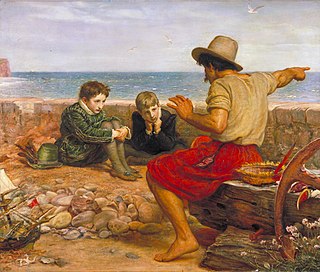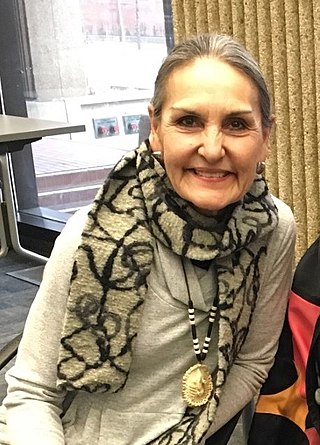This article needs additional citations for verification .(October 2023) |
Billy Teare is an Irish storyteller. Originally from Ballycarry, he now resides in Larne, County Antrim, Northern Ireland. [1] He has appeared on radio, stage, TV and film.
This article needs additional citations for verification .(October 2023) |
Billy Teare is an Irish storyteller. Originally from Ballycarry, he now resides in Larne, County Antrim, Northern Ireland. [1] He has appeared on radio, stage, TV and film.
From his teens, Teare began a career on the Belfast stand up comedy circuit, and entered a number of talent shows, winning several, and performing throughout Northern Ireland, as well as gigs in Scotland and England, into the 1990s.
In the past thirty years, he has told stories in hundreds of early years settings, schools, libraries, community groups, council and cultural venues, as well as being a featured artist at many of the major folk and storytelling festivals around the world, including the far reaches of the Yukon. He incorporates songs, music, magic, juggling and other theatrical skills, to enliven a multi cultural feast of original, modern and traditional tales, monologues, rhymes, chants and audience participation. Teare has worked collaboratively with various other artists and groups, including BBC Northern Ireland and the Verbal Arts Centre, Derry.
Among his appearances have been: Storyteller in Residence, International Storytelling Centre, Tennessee, 2008, BBC Folk Proms event 2008, return performance at the Yukon International Storytelling Festival (2000, 2001, 2006), Beyond the Border: The Wales International Storytelling Festival (2005), The Toronto International Storytelling Festival, Sidmouth International Folk Festival (1999, 2001, 2003)
In 2013 Billy Teare co wrote a volume of 'Antrim Folk Tales' with Kathleen O'Sullivan, his storytelling partner for over twenty years. The book was published by The History Press, Ireland. In 2020 stories from the book were included in 'The Anthology of Irish Folk Tales' also published by The History Press. [1]

Storytelling is the social and cultural activity of sharing stories, sometimes with improvisation, theatrics or embellishment. Every culture has its own stories or narratives, which are shared as a means of entertainment, education, cultural preservation or instilling moral values. Crucial elements of stories and storytelling include plot, characters and narrative point of view. The term "storytelling" can refer specifically to oral storytelling but also broadly to techniques used in other media to unfold or disclose the narrative of a story.
A seanchaí is a traditional Gaelic storyteller or historian. In Scottish Gaelic the word is Scottish Gaelic: seanchaidh. The word is often anglicised as shanachie.

Antonio Sacre is an American author, solo performer, and storyteller. He writes and performs internationally, in English and Spanish.
Edmund Lenihan, also known as Eddie Lenihan, is an Irish author, storyteller, lecturer and broadcaster. He is one of the few practising seanchaithe remaining in Ireland. He has been called "one of the greatest of Irish story-tellers" and "a national treasure".
Maurice Henry Leitch MBE was a Northern Irish author. Leitch's work included novels, short stories, dramas, screenplays and radio and television documentaries. His first novel was The Liberty Lad, published in 1965. His second novel, Poor Lazarus was awarded the Guardian Fiction Prize in 1969, and Silver's City won the Whitbread Prize in 1981.

Sheila Kay Adams is an American storyteller, author, and musician from the Sodom Laurel community in Madison County, North Carolina.

Bobby Norfolk is an American storyteller and arts educator.
The National Storytelling Festival has operated for over half a century. This event showcases the rich heritage of Appalachian Folk Tradition annually in October. The festival attracts storytellers and enthusiasts from all over the world. It was first established in 1973 and has become one of the most renowned storytelling events in the United States. The three-day festival treats attendees to various storytelling performances, workshops, and other events. The festival provides a unique opportunity to experience the power of storytelling and connect with others who value this art form. The festival also features a variety of storytelling styles, including humorous, dramatic, and poignant performances. In addition to the main stage events, the festival offers workshops and other opportunities for attendees to hone their storytelling skills and learn from experienced storytellers.
The Yukon International Storytelling Festival was held every Summer in Whitehorse, Yukon, generally in an outdoor setting. Cofounders of the storytelling festival were storytellers Louise Profeit-Leblanc and Anne Taylor. Profeit-Leblanc, from the Northern Tutchone Nation, was the niece of Angela Sidney, one the Yukon's last Tagish. Sidney had devoted her life to preserving the stories of the Tagish of Southern Yukon, Profeit-Leblanc and Taylor were motivated to found a more local venue for sharing Yukon stories when they realized that Sidney had had to travel in 1984 to the Toronto Festival of Storytelling to disseminate her peoples' stories to a world audience. In 1987 interested parties came together to plan the first Yukon Storytelling Festival in 1988. It later grew beyond the scope of Yukon and Canada to attract storytellers from all over the world with an emphasis on native peoples storytelling and circumpolar countries.

Taffy Thomas, MBE is a storyteller, based in Grasmere in the English Lake District.
Fran Stallings is an American storyteller for people of all ages. She has performed at numerous national and international storytelling festivals, in schools and libraries, and on the radio. She performs primarily folktales from around the world. She has authored several audio recordings and books of stories and songs.
Australia traditional storytelling, handed down from generation to generation, has always been part of the landscape. Since the beginning of time storytelling played a vital role in Australian Aboriginal culture, one of the world's oldest cultures. Aboriginal children were told stories from a very early age; stories that helped them understand the air, the land, the universe, their people, their culture, and their history. Elders told stories of their journeys and their accomplishments. As the children grew into adults they took on the responsibility of passing on the stories. These stories are as much a cultural necessity as they are entertainment and are still passed on orally though many are now recorded in print, audio and video

Oral storytelling is an ancient and intimate tradition between the storyteller and their audience. The storyteller and the listeners are physically close, often seated together in a circular fashion. The intimacy and connection is deepened by the flexibility of oral storytelling which allows the tale to be moulded according to the needs of the audience and the location or environment of the telling. Listeners also experience the urgency of a creative process taking place in their presence and they experience the empowerment of being a part of that creative process. Storytelling creates a personal bond with the teller and the audience.
The Crick Crack Club is a UK-based performance storytelling promoter, founded in 1987. It programs and tours public performances in theaters and art centers nationally, trains and mentors storytellers, undertakes research and advises on the use of oral storytelling in museums and educational settings.

Hugh Morgan Hill who performed as Brother Blue, was an American educator, storyteller, actor, musician, and street performer based principally in the Boston area. After serving as First Lieutenant from 1943 to 1946 in the segregated United States Army in World War II and being honorably discharged, he received a BA from Harvard College in 1948, was accepted into the Harvard Graduate School of Arts and Sciences (GSAS) before transferring to receive a MFA from the Yale School of Drama and a Ph.D. from the Union Institute, having delivered his doctoral presentation at Boston's Deer Island Prison, accompanied by a 25-piece jazz orchestra, with a video recording for his dissertation committee's further consideration. While performing frequently at U.S. National Storytelling Festivals and flown abroad by organizations and patrons from England to Russia and the Bahamas, Brother Blue regularly performed on the streets around Cambridge, most notably in Harvard Square. He was the Official Storyteller of Boston and of Cambridge by resolutions of both city councils.

Louise Profeit-LeBlanc is an Aboriginal storyteller, cultural educator artist, writer, choreographer, and film script writer from the Northern Tutchone Nation, Athabaskan language spoken in northeastern Yukon in Canada. She was raised in Mayo.
Liz Weir is a Northern Irish children's writer and storyteller. She is currently Storyteller in Residence in Belfast and has written 27 stories. She is involved in a number of storytelling organisations including The Early Years Organisation, where she talks to children about racism, anti-bullying and respect for the elderly.
The Adäka Cultural Festival is an annual multi-disciplinary arts and culture festival in Whitehorse, Yukon that celebrates First Nations arts and culture, with a specific focus on Yukon First Nations. 'Adäka', in the Southern Tutchone language, means 'coming into the light' which reflects the Yukon First Nations arts and culture being brought forward to the public eye and celebrated by all. The Festival name was inspired by the work of Joe Johnson, the late father of Festival co-founder, Katie Johnson. Several years prior to the launch of Adäka, Johnson had been involved in a conference of the same name. That conference brought the people of the Yukon together to identify areas of concern and exchange thoughts on heritage and culture in the Yukon. The conference aimed to initiate dialogue between the two main Yukon cultures so that everyone could "come into the light" together.

Pleasant DeSpain is an international storyteller, world traveler, and author of multicultural story collections and picture books, many of which are used in elementary schools and libraries as multicultural teaching aids. He has performed in more than 3,000 schools, theaters, conventions, libraries, and churches in America, Canada, Mexico, Thailand, Southeast Asia, and Central America.
Linda Goss, sometimes known professionally as Mama Linda, is an American storyteller and performer in the African diasporic oral tradition. She is a co-founder of the National Association of Black Storytellers, which works to preserve folk traditions.